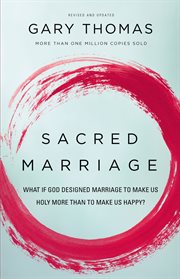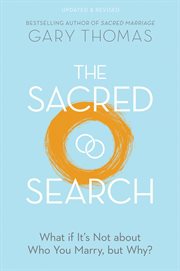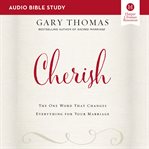Sacred Marriage Copyright © 2000 by Gary L. Thomas Requests for information should be addressed to: Zondervan, Grand Rapids, Michigan 49530 Library of Congress Cataloging-in-Publication Data Thomas, Gary, 1961- Sacred Marriage: what if God designed marriage to make us holy more than to make us happy / Gary Thomas. p. cm. Includes bibliographical references. ISBN-10: 0-310-24282-7 (softcover) ISBN-13: 978-0-310-24282-6 1. Spouses--Religious life. 2. Marriage--Religious aspects--Christianity. 3. Spiritual life--Christianity. I. Title. BV4596.M3 T46 2000 248.4-dc 21 99-053471 All Scripture quotations, unless otherwise indicated, are taken from the Holy Bible: New International Version®. NIV®. Copyright © 1973, 1978, 1984 by International Bible Society. Used by permission of Zondervan. All rights reserved. All rights reserved. No part of this publication may be reproduced, stored in a retrieval system, or transmitted in any form or by any means--electronic, mechanical, photocopy, recording, or any other--except for brief quotations in printed reviews, without the prior permission of the publisher. Interior design by Korina Kelley Printed in the United States of America 05 06 07 08 09 10 11 12 • 38 37 36 35 34 33 32 31 30 29 28 27 26 25 ONE THE GREATEST CHALLENGE IN THE WORLD A CALL TO HOLINESS MORE THAN HAPPINESS By all means marry. If you get a good wife, you'll become happy. If you get a bad one, you'll become a philosopher. --Socrates Like everything which is not the involuntary result of fleeting emotion but the creation of time and will, any marriage, happy or unhappy, is infinitely more interesting than any romance, however passionate. --W. H. Auden I'm going to cut him open. Historians aren't sure who the first physician was who followed through on this thought, but the practice revolutionized medicine. The willingness to cut into a corpse, peel back the skin, pull a scalp off a skull, cut through the bone, and actually remove, examine, and chart the organs that lay within was a crucial first step in finding out how the human body really works. For thousands of years physicians had speculated on what went on inside a human body, but there was a reluctance and even an abhorrence to actually dissect a cadaver. Some men refrained out of religious conviction; others just couldn't get over the eeriness of cutting away a human rib cage. While an occasional brave soul ventured inside a dead body, it wasn't until the Renaissance period (roughly the fourteenth to the sixteenth century) that European doctors routinely started to cut people open. And when they did, former misconceptions collapsed. In the sixteenth century, Andreas Vesalius was granted a ready supply of criminals' corpses, allowing him to definitively contradict assumptions about the human anatomy that had been unquestioned for a thousand years or more. Vesalius's anatomical charts became invaluable, but he couldn't have drawn the charts unless he was first willing to make the cut. I want to do a similar thing in this book--with a spiritual twist. We're going to cut open numerous marriages, dissect them, find out what's really going on, and then explore how we can gain spiritual meaning, depth, and growth from the challenges that lie within. We're not after simple answers-- three steps to more intimate communication, six steps to a more exciting love life--because this isn't a book that seeks to tell you how to have a happier marriage. This is a book that looks at how we can use the challenges, joys, struggles, and celebrations of marriage to draw closer to God and to grow in Christian character. We're after what a great Christian writer, Francis de Sales, wrote about in the seventeenth century. Because de Sales was a gifted spiritual director, people often corresponded with him about their spiritual concerns. One woman wrote in great distress, torn because she very much wanted to get married while a friend was encouraging her to remain single, insisting that it would be "more holy" for her to care for her father, and then devote herself as a celibate to God after her father died. De Sales put the troubled young woman at ease, telling her that, far from being a compromise, in one sense, marriage might be the toughest ministry she could ever undertake. "The state of marriage is one that requires more virtue and constancy than any other," he wrote. "It is a perpetual exercise of mortification. . . . From this thyme plant, in spite of the bitter nature of its juice, you may be able to draw and make the honey of a holy life."1 Notice that de Sales talks about the occasionally "bitter nature" of marriage's "juice." To spiritually benefit from marriage, we have to be honest. We have to look at our disappointments, own up to our ugly attitudes, and confront our selfishness. We also have to rid ourselves of the notion that the difficulties of marriage can be overcome if we simply pray harder or learn a few simple principles. Most of us have discovered that these "simple steps" work only on a superficial level. Why is this? Because there's a deeper question that needs to be addressed beyond how we can "improve" our marriage: What if God didn't design marriage to be "easier"? What if God had an end in mind that went beyond our happiness, our comfort, and our desire to be infatuated and happy as if the world were a perfect place? What if God designed marriage to make us holy more than to make us happy? What if, as de Sales hints, we are to accept the "bitter juice" because out of it we may learn to draw the resources we need with which to make "the honey of a holy life"? Romanticism's Ruse If this sounds like a radically different view of marriage, it's important to remember that the very concept of "romantic love," which is so celebrated in movies, songs, and cheap paperbacks, was virtually unknown to the ancients. There were exceptions--one need merely read the Song of Songs, for instance--but taken as a whole, the concept that marriage should involve passion and fulfillment and excitement is a relatively recent development on the scale of human history, making its popular entry toward the end of the eleventh century.2 C. S. Lewis--whose marriage to an ailing woman was seen as somewhat "odd" by many of his contemporaries--explained that such a monumental shift in cultural thought as the development of romantic love is "very rare--there are perhaps three or four on record--but I believe that they occur, and that this [romantic love] is one of them."3 This is not to suggest that romance itself or the desire for more romance is necessarily bad; good marriages work hard to preserve a sense of romance. But the idea that a marriage can survive on



